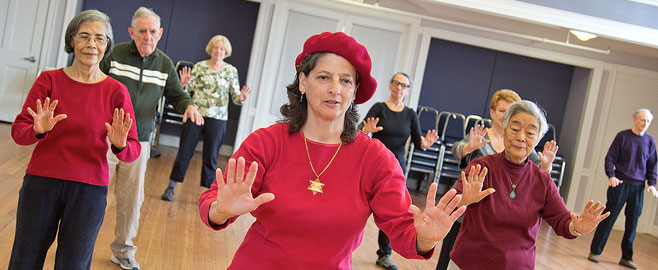By Ann L. Hartstein, Secretary, Executive Office of Elder Affairs
September is Healthy Aging month, and healthy living is the path to healthy aging. Five years ago the Patrick Administration launched its Aging Agenda, just ahead of the Baby Boomer Age In, which began in 2011 as the first of the boomers celebrated their 65th birthdays. Acknowledging that aging begins at birth, and that all of us who are alive are aging, the Aging Agenda is based on nine principles for a healthy lifestyle.

The roadmap to healthy aging includes: living in an integrated intergenerational society; maintaining a healthy diet and adequate exercise; pursuing the best possible education and lifetime learning; continuing to be involved in social and civic life; engaging in active career and job building; saving money in early life for later life needs; making adaptable housing choices; and remaining in control of one’s life.
Across the lifespan, the Commonwealth has a wide range of programs to promote healthy lifestyles, programs such as Mass In Motion in 52 communities, offering a range of exercise and healthy diet opportunities to local residents. The Massachusetts Department of Transitional Assistance (DTA), the Massachusetts Department of Agricultural Resources (MDAR) and the Executive Office of Elder Affairs are collaborating to highlight the value of using SNAP (Supplemental Nutrition Assistance Program), WIC (Women and Infant Children) and SFMP (Senior Farmers Market Nutrition Coupons) at local Farmers Markets, many of which offer double the face value of the coupon to expand consumer purchasing power. In fact, DTA Commissioner Stacey Monahan and MDAR Commissioner Greg Watson and I have traveled across the state engaging in cooking demonstrations to underscore the health and budget benefits of including locally grown produce in every diet.
For many seniors, healthy lifestyles are as close as their local senior centers and recreation departments. There are 349 councils on aging and senior centers in Massachusetts and most of them offer regular exercise programs for beginners, people with chronic conditions and for more athletic seniors. A number of communities promote year-round and seasonal walking groups as well. Many senior centers also offer Chronic Disease Self -Management classes to inform and empower seniors to manage and take charge of their own chronic conditions. You can find more information about the network of evidence-based programs in Massachusetts to empower adults living with one or more chronic conditions through the Healthy Living Center of Excellence (HLCE). In addition to CDSME, program such as Diabetes Self-Management, Matter of Balance (fear of falling), and Healthy Eating all are available through the councils on aging, Area Agencies on Aging, and other community based organizations.
Having been a council on aging director for 11 years, I was always impressed by the interest in exercise programs, even if people had not been athletic in earlier life. Today’s seniors, especially baby boomers, understand the value of healthy diets and exercise and are much more inclined to incorporate both in their later lives.
Lifelong community involvement is essential to a healthy life. People really do benefit from interacting with other people whatever their age. Depression is NOT a normal consequence of aging, but isolation may cause feelings of despair. At the same time, senior centers offer a broad range of activities to help people stay engaged. For people who are home-bound, many senior centers offer “friendly” visitors and “friendly” callers. Meals on Wheels offers nutritious meals and regular, dependable human contact to people who can’t travel to one of the Commonwealth’s 350 meal sites.
Studies show that older people who are engaged in meaningful activities such as mentoring, maintain better cognitive health. In Massachusetts, Foster Grandparents serve an essential role in mentoring and tutoring inner-city school children. Many communities rely on seniors for a variety of volunteer activities from delivering meals on wheels to providing essential health insurance information as a SHINE (Serving the Health Insurance Needs of Everyone) counselor.
I think the most critical ingredient to healthy living and healthy aging is the elimination of ageism. We all have a role in dispelling the notion that age inevitably diminishes intellectual and cognitive function. While some people do experience some memory issues, that is not a given in aging. We all need to promote a positive attitude to older people and to our own aging process. Yale University Medical School released the results of a longitudinal study showing that people who expressed negative attitudes about aging earlier in their lives were likely to live seven years less than people with positive or neutral attitudes. So, let’s start the journey to healthy aging on a positive path with a positive attitude about the benefits of living and aging well.
